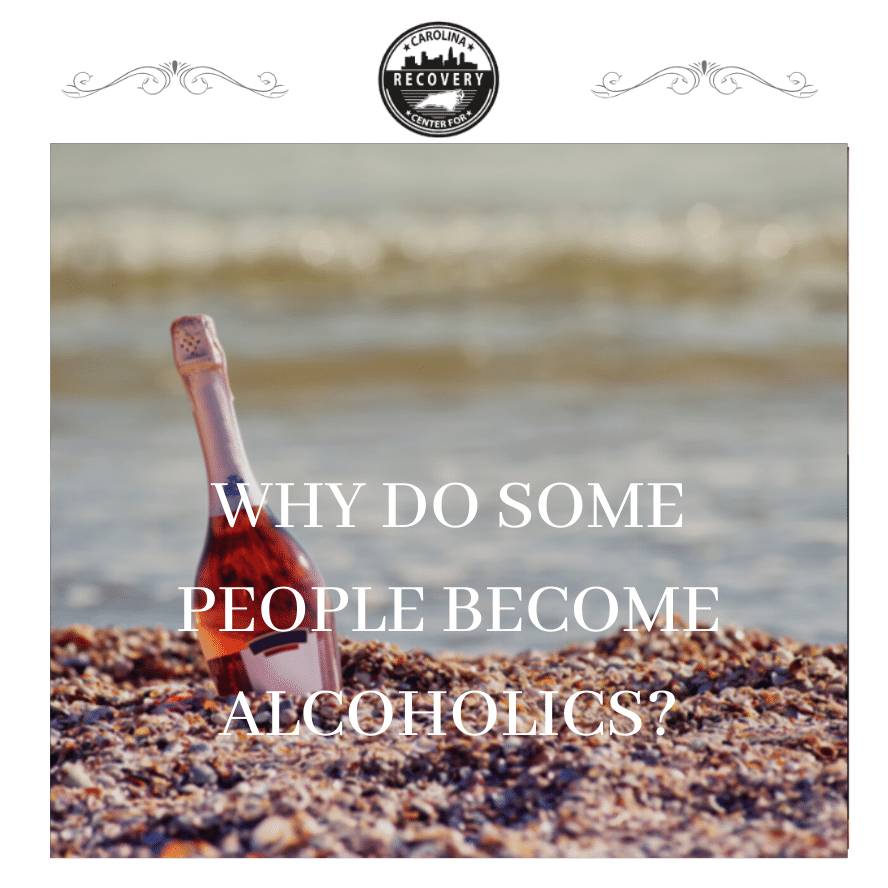Why Some People Become Alcoholics and Others Don’t

Medically Verified: 2/1/24
Medical Reviewer
Chief Editor

All of the information on this page has been reviewed and verified by a certified addiction professional.
If you or someone you care for is struggling with alcoholism you may have wondered why some people become alcoholics and others don’t. Why is it that one person can have just one beer while others can’t seem to stop drinking? At a glance, alcoholism may seem like a random occurrence, but it is far more complicated than that. In fact, there are numerous factors that account for why some people are at a higher risk of developing alcoholism including genetics, psychological, environmental, and social conditions.[1]
The Top Reasons Why People Become Alcoholics
Although nobody purposefully becomes an alcoholic, millions of people battle alcohol use disorder. When someone abuses alcohol, they might drink in excess. This eventually has negative impacts on brain chemistry leading to addiction. The chemical changes from long term alcohol abuse result in a person developing both physical and psychological dependence. As a result, virtually anyone can become an alcoholic if they continue to abuse it over long periods of time.
However, in addition to chronic drinking, there are many components that make one person more likely to abuse alcohol than another. While having one or more of these risk factors puts an individual at a higher risk of developing alcohol use disorder, being aware of them can help prevent engaging in unhealthy behaviors that lead to alcoholism. Here are the most common reasons why people become alcoholics.
Exposure to Chronic Stress
People working high-stress jobs or with stressful home situations are more likely to develop alcoholism. These situations make individuals more likely to turn to drinking as a means to cope with the stress they experience in their daily lives. [2] When stress exposure is chronic, it leads to ongoing alcohol abuse and eventually addiction.
Starting to Drink at a Young Age
Alcoholism typically develops in a person’s 20s or 30s, however, individuals who start drinking early on in life are more likely to develop alcoholism later on. This is especially true of teenagers who engage in binge drinking. These behaviors usually start from experiencing peer pressure or encouragement from friends to binge drink. This instills unhealthy drinking habits at a young age and increases the risk of alcohol use disorder. Therefore, people who drink at an early age and continue the habit are more likely to become alcoholics compared to those who do not.
Family History of Alcoholism
Research has shown an increasing link between alcoholism and genetics. [3] In fact, multiple genes are linked to a higher instance of alcoholism. These genes regulate a person’s ability to metabolize or process alcohol more efficiently, making the subsequent hangovers less severe. The lack of physical consequences felt after binge drinking serves to encourage and perpetuate unhealthy behaviors. This genetic component makes people with alcoholics in the family, especially alcoholic parents, significantly more likely to suffer from alcohol use disorder.
Past Trauma
Individuals who experience traumatic life events are much more likely to develop Post-Traumatic Stress Disorder (PTSD). PTSD develops after someone is exposed to emotional or physical trauma leading to long-lasting psychological consequences. People suffering from PTSD are far more likely to develop alcoholism. [4] They often turn to alcohol as a way to self-medicate and cope with PTSD symptoms, perpetuating a cycle of misuse and inevitable addiction. Unfortunately, trauma is a major risk factor that contributes to why some people become alcoholics.
Mental Illness
There is also a strong link between mental illness and higher instances of alcohol use disorder. For example, people suffering from depression and anxiety will frequently use alcohol as a way to decrease their unpleasant symptoms.[5] Although alcohol initially lessens feelings of anxiety and depression, chronic alcohol abuse eventually worsens these conditions. The result is that people will use increasing amounts of alcohol and they eventually become addicted.
Treatment for Alcoholism
Being aware of the risk factors for alcoholism helps to identify if you or a loved one are more susceptible to alcoholism. However, even with this awareness many people still become alcoholics. Unfortunately, alcoholism wreaks havoc in a person’s and causes suffering for themselves and the people around them. The only way to end the suffering and torment that alcohol causes is to seek treatment.
Treatment for alcoholism addresses the common risk factors to reverse old behaviors that led to alcoholism and instill new ones that promote sobriety. This includes inpatient treatment at an accredited addiction treatment center. Programs are usually 30 days long and during this time individuals suffering from alcoholism will receive the care and support they need to start their journey to sobriety.
Inpatient drug and alcohol programs include intensive therapy to address the underlying causes of alcoholism. In addition to working through past traumas and current issues, individuals learn new coping mechanisms that include healthy behaviors to reduce the risk of relapse.
Where to Find Help if You or a Loved One is an Alcoholic
Carolina Center for Recovery is an accredited drug and alcohol treatment center. With a holistic approach to treating alcoholism, we offer different treatment programs to fit each person’s unique needs. Our therapists work closely with you to treat the underlying causes and risk factors for alcoholism. Getting over alcoholism isn’t easy, but it is possible with a little help. If you or a loved one is suffering from alcoholism, call today.
- https://www.mayoclinic.org/diseases-conditions/alcohol-use-disorder/symptoms-causes/syc-20369243
- https://pubs.niaaa.nih.gov/publications/AA85/AA85.htm#:~:text=Problems%20arise%2C%20however%2C%20when%20stress,the%20risk%20for%20alcohol%20dependence.
- https://www.ncbi.nlm.nih.gov/pmc/articles/PMC4056340/
- https://www.ptsd.va.gov/understand/related/problem_alcohol_use.asp
- https://www.ncbi.nlm.nih.gov/pmc/articles/PMC5958183/

